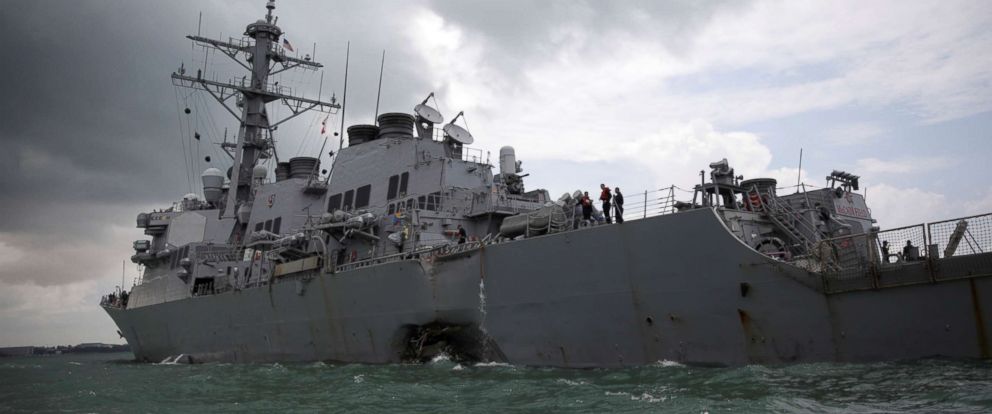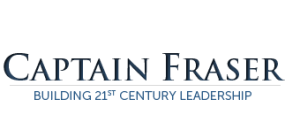Keynote Topics
“Damn the Torpedoes, Full Speed Ahead”
The Four Basic Traits of Leadership

Admiral David Farragut and his Union ships were attempting to enter Mobile Bay in 1864. With Confederate guns firing on them on both sides, the lead ship of his column hit a mine and blew up. The ships behind stopped, wondering what to do. That’s when Admiral David Farragut gave his famous order: “Damn the Torpedoes, Full Speed Ahead!” It was a courageous decision, but it was not a spur of the moment. It was made mainly because of four leadership traits learned over centuries by ship captains around the world.
Captain Fraser shows how he learned, painfully, the four basic leadership traits in his first 60 seconds at the U.S. Naval Academy, and how he used them in the following years of his naval and business careers. The four traits are personal accountability, thinking, ethics, and motivation. He shows how the same traits used by ship captains can also be learned by managers ashore.
It’s a presentation that encourages an audience at any managerial level to think about their own leadership styles from the unique viewpoint of a ship captain. Thinking about leadership from a captain’s viewpoint can enhance careers and make businesses more competitive.
“I Have Not Yet Begun to Fight!”
How to Motivate Crews and Employees

When asked by a British captain during a battle if the American Captain John Paul Jones desired to surrender, Captain Jones replied: “I have not yet begun to fight!” The crew gave a yell, and the American ship went on to win the battle.
Using Captain John Paul Jones’ dramatic response and other personal illustrations, Captain Fraser focuses on what motivates leaders and their crews/employees, both afloat and ashore, to perform at high levels. It’s more than corporate retreats and bonuses. He shows how a manager can motivate through an understanding of “why” employees work in a job, how confidence through training builds morale, why the technical competence of a manager is crucial, and how communications can make or break a leader.
This fast paced presentation is kept interesting by using personal and historical examples of how leaders can motivate their employees. It is effective because it encourages the audience to look at motivation from a unique viewpoint, and in doing so it helps the audience remember the key points will into the future.
This is not a drill! Brace for collision!
Why Recent Navy Ship Collisions Happened; What the Navy is Doing To Fix the Causes; and What Lessons Learned Are There for Business Organizations

In 2017 Navy ships had three collisions with civilian merchant ships and one grounding. Seventeen sailors lost their lives and the cost of correcting the damages may exceed over one billion dollars. The Navy did an exhaustive investigation into each incident and has reported the findings publicly.
Additionally, a review of the common causes of these disasters, combined with a wider review of fleet practices and operations, was also released. The findings of both contain lessons that any business or organization could use to review its own practices and operations, not only to prevent disasters but to also improve day to day management and leadership.
This presentation describes minute by minute how the collisions occurred and the actions taken by the ships’ crews after the collisions. It summarizes the investigation findings, showing that causes of each incident were remarkably the same: lack of awareness, lack of training, lack of sleep, and overall a lack of command leadership by the captain.
The presentation shows how the disaster causes and the Navy’s extensive plan to correct the causes can be used by any organization to examine its own culture, operations, day to day management, and general sense of accountability by managers and senior executives. It is the most requested topic for presentations.
Ethics, Confidence and Trust
How a Moral Code Can Make a Career and Business Successful

A Wall Street Journal editorial on the courts martial of the captain of a ship which was sunk in a collision with an aircraft carrier, killing most of the crew and the captain, said this: “…men will not long trust leaders who feel themselves beyond accountability for what they do. And when men lose confidence and trust…order disintegrates into chaos and purposeful ships into derelicts.” Businesses can disintegrate into chaos and bankruptcy too.
This presentation shows why trust is so important in the competitive business world of today and in fact ought to be the key to obtaining and keeping clients. Why is it that a Readers Digest poll finds that 69% of Americans trust military officers but only 22% trust business executives? Why is it only 8% trust Congress but in every election around 95% of Congress gets re-elected?
The presentation focuses on how we can create a personal code of ethics like most ship captains. It shows how we can be ready to make moral decisions before we know what the decision may be. Reactive morals don’t work.
